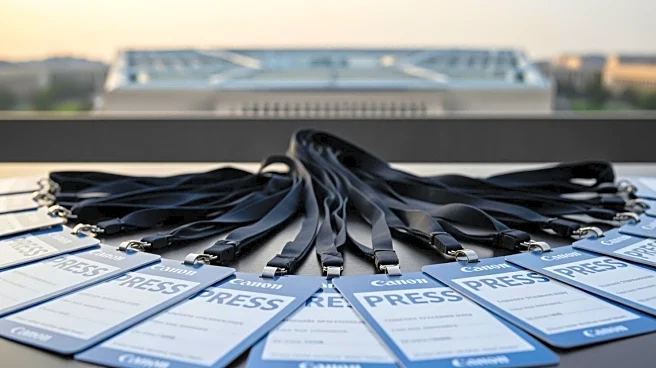What's Happening?
Journalists covering the Pentagon have begun turning in their press passes following the implementation of new access restrictions by Defense Secretary Pete Hegseth. The policy requires reporters to sign
an agreement that restricts the publication of information not authorized by the Department of Defense, even if it is unclassified. Major news outlets, including Fox News, Newsmax, and The Daily Caller, have rejected the policy, citing concerns that it criminalizes routine reporting and undermines press freedom. The move has sparked silent protests among journalists, with posters declaring 'journalism is not a crime' appearing in the Pentagon's press areas. The Military Reporters and Editors organization has condemned the policy as an attack on the First Amendment.
Why It's Important?
The Pentagon's new press policy represents a significant shift in how military affairs are covered by the media, potentially limiting the public's access to information about defense operations and decisions. By restricting journalists' ability to report freely, the policy could impact the transparency and accountability of the Department of Defense. The refusal of major news outlets to comply with the guidelines underscores the importance of press freedom in a democratic society and highlights the challenges faced by journalists in covering government activities. This development may also influence public perception of the Pentagon and its relationship with the media.
What's Next?
As journalists continue to turn in their press passes, the Pentagon may face increased scrutiny and pressure to revise or rescind the new policy. Media organizations are likely to seek alternative ways to cover military affairs, potentially relying on sources outside the Pentagon or pursuing legal challenges to the restrictions. The situation may also prompt discussions among policymakers and advocacy groups about the need to protect press freedom and ensure transparency in government operations. The outcome of these efforts could shape the future of media access to the Pentagon and other government agencies.
Beyond the Headlines
The Pentagon's restrictive press policy raises broader concerns about the role of the media in holding government accountable and the potential consequences of limiting access to information. The policy may set a precedent for other government agencies to impose similar restrictions, further complicating the media's ability to report on public affairs. This development also highlights the ongoing debate over the balance between national security and the public's right to know, emphasizing the need for clear guidelines that protect both interests.










